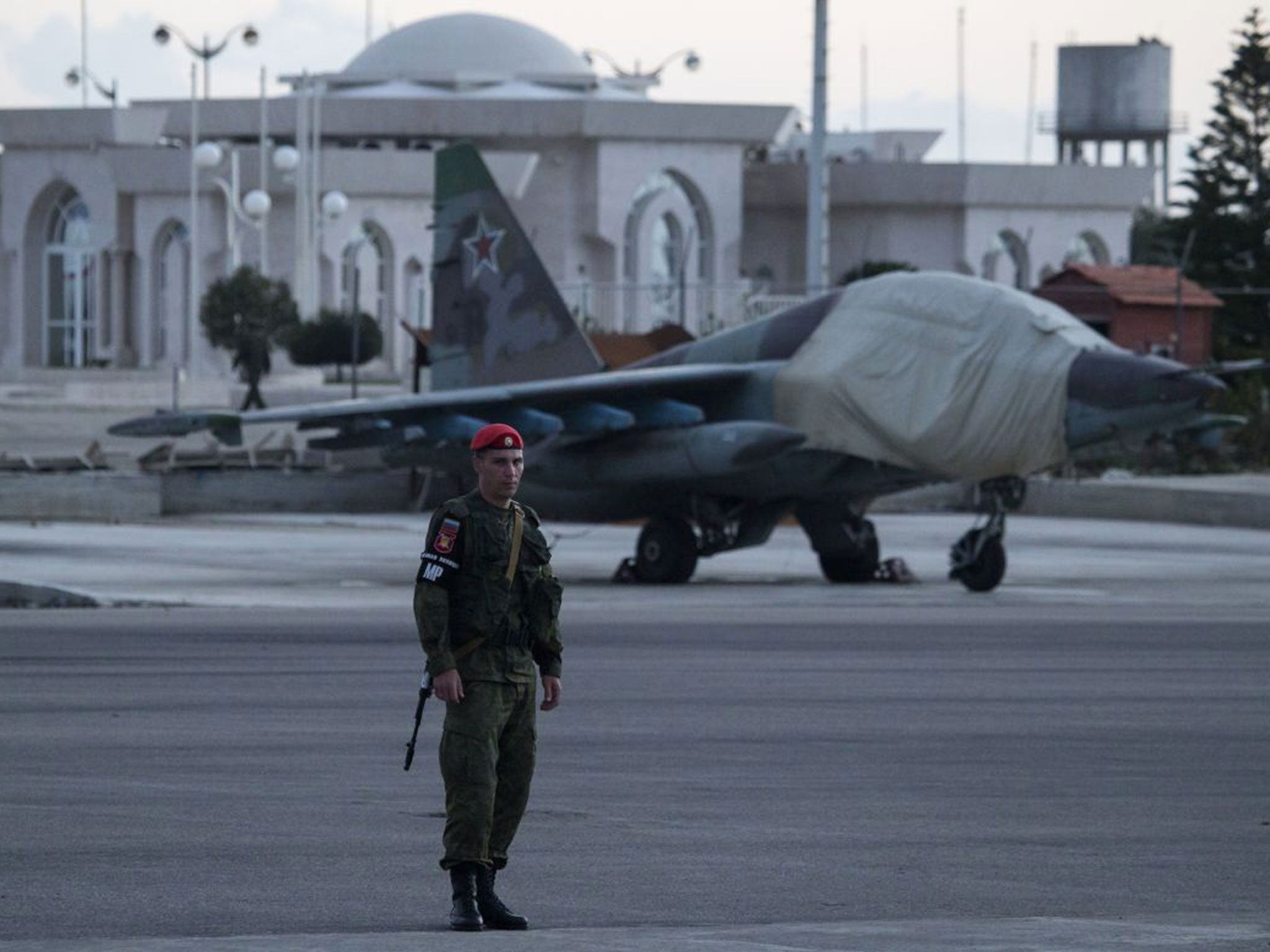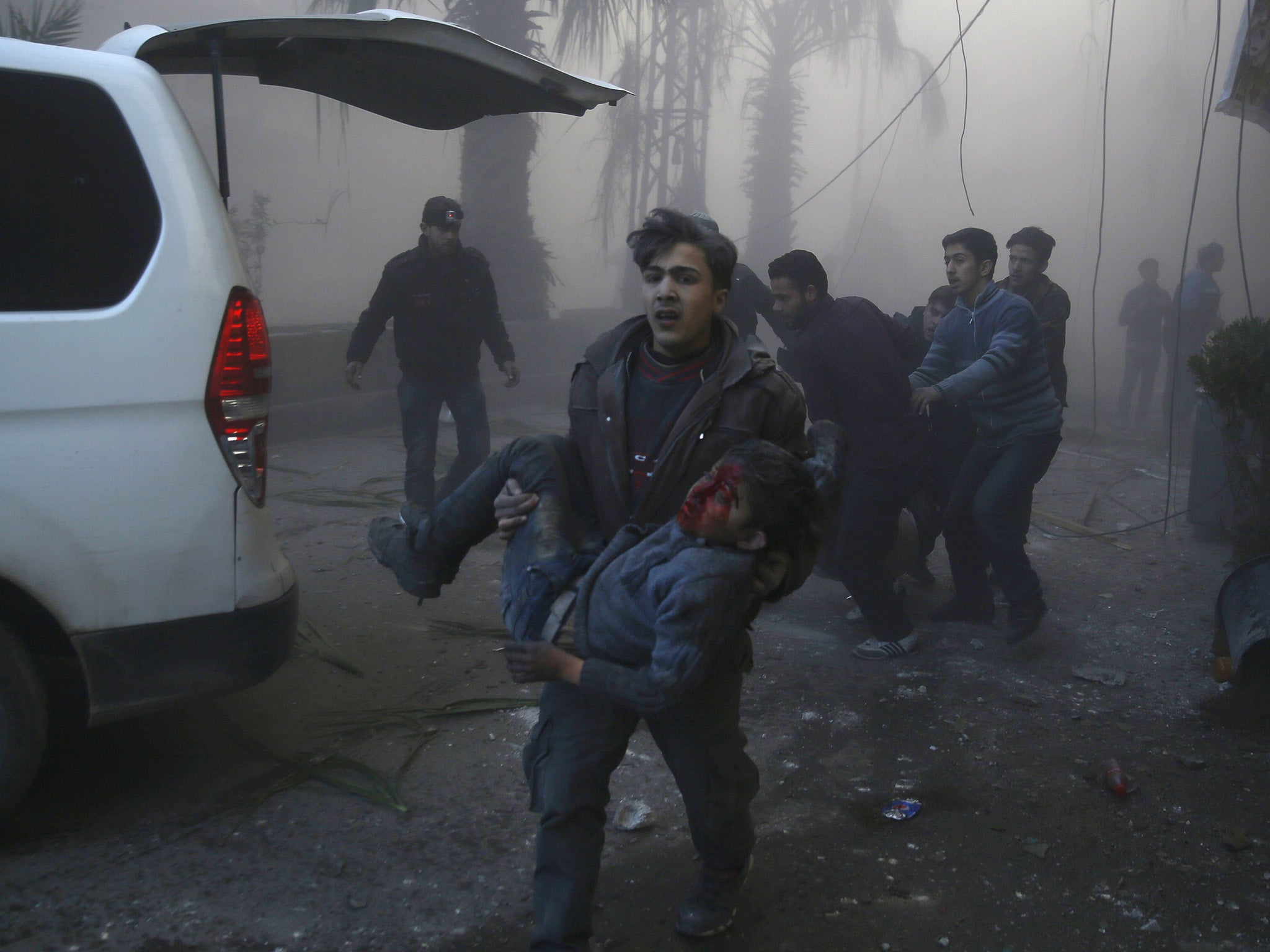Vladimir Putin orders Russian military to begin withdrawal from Syria
Troops will begin pulling out from the country on Tuesday as Russian President says 'objectives have been achieved'

Your support helps us to tell the story
From reproductive rights to climate change to Big Tech, The Independent is on the ground when the story is developing. Whether it's investigating the financials of Elon Musk's pro-Trump PAC or producing our latest documentary, 'The A Word', which shines a light on the American women fighting for reproductive rights, we know how important it is to parse out the facts from the messaging.
At such a critical moment in US history, we need reporters on the ground. Your donation allows us to keep sending journalists to speak to both sides of the story.
The Independent is trusted by Americans across the entire political spectrum. And unlike many other quality news outlets, we choose not to lock Americans out of our reporting and analysis with paywalls. We believe quality journalism should be available to everyone, paid for by those who can afford it.
Your support makes all the difference.Vladimir Putin has announced that Russian troops will begin a partial withdrawal from Syria, in a surprise move that could herald a major shift in the conflict.
In a claim given a wary welcome by the Syrian opposition, the Russian President said that his five-month military campaign in support of President Bashar al-Assad had “achieved its aims”, and ordered his Foreign Minister to “intensify” Moscow’s role in peace talks that have resumed in Geneva.
Announcing his decision in a televised meeting with ministers at the Kremlin, Mr Putin said he had ordered the withdrawal of “the main part of our military contingent” but said a Russian airbase and naval facility in the country would continue to operate.

The announcement comes as Syria marks the fifth anniversary of the uprising against President Assad. Moscow has been one of the staunchest allies of Damascus, and the Russian military intervention at the end of September shifted the momentum in the conflict in its favour.
The presidential spokesman, Dmitry Peskov, said that Mr Assad had agreed to the decision following a telephone conversation with Mr Putin. Syria’s state news agency quoted the Syrian President as saying that the collaboration between Russian and Syrian forces has secured “victories against terrorism and returned security to the country”.
While its intervention was officially launched to combat terrorist groups, Russia has been widely accused of using a relentless air campaign to target more moderate rebel groups as well as hundreds of civilian targets including schools and hospitals.
The latest announcement will be met with cynicism in Western capitals, where diplomats say that Mr Putin has proved to be a mercurial and untrustworthy partner not just in the Syria conflict but also in the war in Ukraine.
Mr Putin said that the withdrawal would begin on Tuesday but did not give a timeline for completion, nor did he specify how many planes and troops would be pulled out. Russia’s airbase in Hmeymim, in Syria’s coastal Latakia province, and its naval facility in the Syrian port of Tartous would remain, he said. Russia’s UN ambassador said that Russia would continue the fight against “terrorists” – a term it has used to describe all those opposed to President Assad.
The official Syrian opposition, which had no prior warning, offered a cautious welcome. It said that, if implemented, a withdrawal would pile pressure on the Syrian government and give new impetus to the drive to reach a negotiated settlement.
Salim al-Muslat, spokesman for the rebel High Negotiations Committee, said: “If this is a serious step it will form a major element of pressure on the regime, because the Russian support prolonged the regime. Matters will change significantly as a result of that.”
The US also said that it had no advance knowledge of the announcement. A spokeswoman for the United Nations Syria envoy, Staffan de Mistura, refused to say whether he was aware of plans. Earlier in the day, Mr de Mistura warned that the only alternative to negotiations was a return to war. He is due to brief the UN Security Council on the developments from Geneva on Monday night.
Mr Putin has always maintained that his forces were engaged in Syria to battle Isis and other groups deemed to be terrorists. Syrian opposition activists and Western diplomats have long insisted that Moscow was instead focused on propping up ailing Syrian government forces. That claim was all but vindicated as Mr Putin said that his mission had “largely been accomplished” even though Isis still remains a major force in Syria, as does the al-Qaeda affiliate Jabhat al-Nusra.
Mr Putin insisted, however, that “Syria’s armed forces and the patriotic Syrian forces have been able to achieve a fundamental turnaround in the fight against international terrorism and have taken the initiative in almost in all respects.”
He said the Russian air campaign had allowed Mr Assad’s military to turn the tide of war and helped create conditions for peace talks. He said some troops would stay in the country to monitor the ceasefire and “create the conditions for the peace process”.
Despite claims that Mr Putin was not serious about halting the violence in Syria, the cessation of hostilities that began at the end of February has defied expectations by largely holding for more than two weeks. That it has done so is largely thanks to pressure by international sponsors on their client groups in Syria, including by Russia. Some analysts have suggested that Mr Putin is eager for Russia to be treated as an equal partner by global powers.
Subscribe to Independent Premium to bookmark this article
Want to bookmark your favourite articles and stories to read or reference later? Start your Independent Premium subscription today.
Join our commenting forum
Join thought-provoking conversations, follow other Independent readers and see their replies
Comments